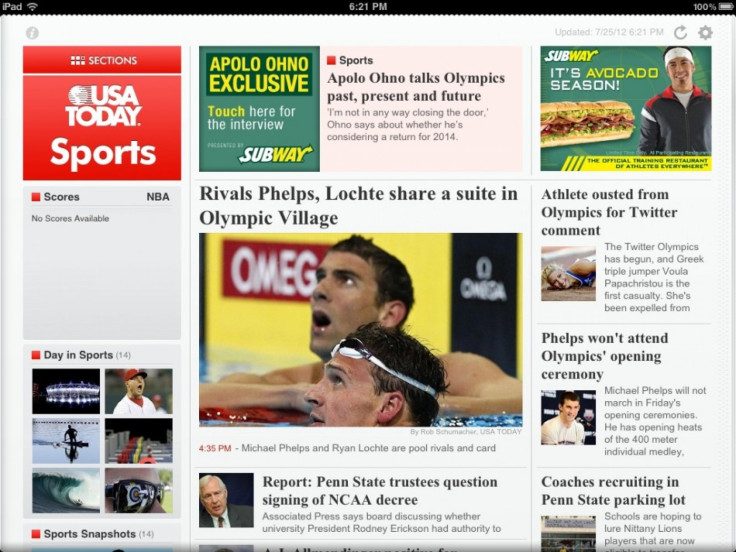Journalism Ethics: Is USA Today's Partnership With Subway Unhealthy?
OPINION

The four cardinal tenets of journalism, according to the Society of Professional Journalists, are to "seek the truth and report it," "minimize harm," "act independently" and "be accountable." The fifth, unofficially, is "advertise."
As much as it might wish to, journalism simply cannot survive without advertising. The two industries have always held hands, even if warily, from the very early beginnings of newspapers to the current Digital Age.
News companies are constantly searching for new ways to fit advertisers into their content to juice the mosty possible profit out of each article they publish. Sometimes, news companies will have advertisers "sponsor" a news story - this is very common in broadcast journalism (TV and radio) - and print news is slowly getting into the business of getting stories sponsored, too. It's already a common practice on online sites like Mashable and VentureBeat, but on Wednesday, USA Today released a sponsored story that blurred the lines between journalism and advertising far too much.
USA Today's Eileen Blass scored an interview with eight-time Olympic medal-winning speed skater Apolo Anton Ohno, and the company wanted to promote the exclusive story on the front page of the sports section. There's nothing wrong with that; the way USA Today went about it, however, was highly questionable.
As seen in an iPad screenshot of the the company's app, the paper placed the exclusive story between two large advertisements, and put a giant Subway promotion directly in the header, right next to the USA Today logo.
The giant advertisement on the left, which read "Apolo Ohno Exclusive" and told readers to "Touch here for the interview," completely overpowered the actual story itself. To the right of the exclusive story was just another plain ad, again featuring Ohno, but having him promote Subway's decision to add avocado, which actually prompted a "news" story from USA Today when Subway added avocado to its menu.
So to recap: An exclusive interview is completely sandwiched (pardon the pun) between two Subway ads, both of which feature the subject of USA Today's exclusive interview. Is this okay?
Blurring The Lines
Stories sponsored by advertisers are already blurring the lines of traditional journalism, but to combine advertising and news so blatantly is a new and dubious step.
Let's think about the money trail: USA Today wants an exclusive interview with an athlete. Subway pays the paper for prime ad placement, and endorses the athlete it wants to interview. Now, there are one of two scenarios: USA Today agreed to place Subway's ads on the sports front page in return for an interview opportunity with one of its stars; or, USA Today did an interview with the athlete, and Subway wanted some prime ad placement using the Ohno ad it already shot, so it felt like a perfect match.
One would hope that the latter scenario was the real one, but regardless of how the deal was made -- whether it was just circumstantial, or serendipitous, or entirely planned -- the final actions speak louder than words. And as you can plainly see, the Subway ads are distracting from the page, and they don't make it clear whether the interview was set up or performed by Subway, or if it was just a poor ad layout choice.
As a reporter who used to work for USA Today, all I can say is that Gannett can do better than this. According to the Pew Research Center, Gannett is the No. 6 most successful major news outlet on the Internet after Time Warner, Comcast, AOL, BBC and CBS. USA Today, aka "McPaper," is already considered somewhat of a joke in and out of the journalism community - "Isn't that newspaper only in hotels?" - but making unethical decisions like these, just for the sake of putting more viewers in front of advertisers, certainly doesn't help improve their reputation. Some lines shouldn't be crossed.
© Copyright IBTimes 2025. All rights reserved.






















